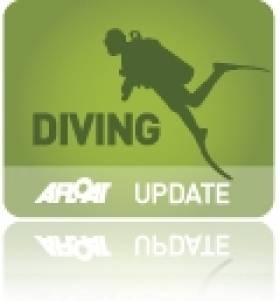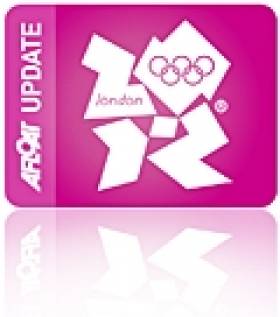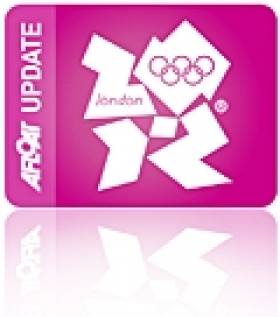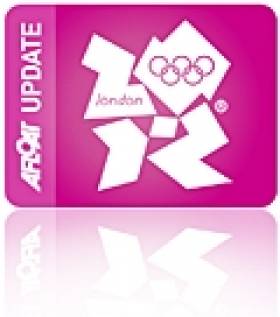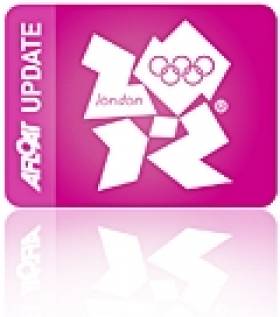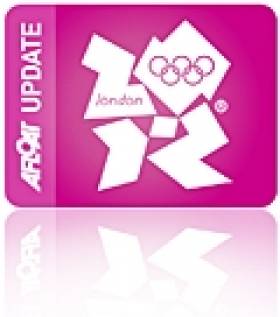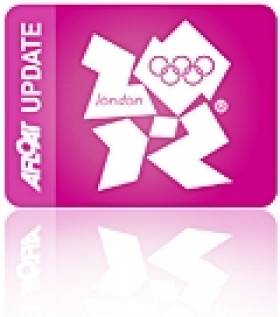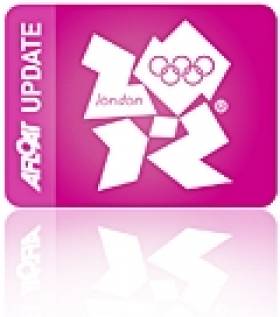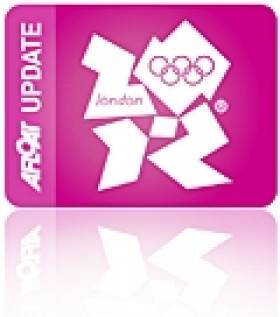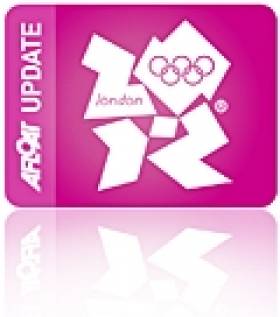Displaying items by tag: Perth
Irishman Drowns While Diving Off Thailand
#Diving - The Irish Times reports that an Irishman has died in a diving accident in Thailand.
Twenty-nine-year-old Colin Callanan from Cork drowned off the island of Koh Tao off the east coast of the South East Asian country on Friday 12 April.
The exact circumstances surrounding his death have not yet been announced.
Callanan was diving in his spare time while on a work trip to the country. He had been based in Perth, Australia for the last six years, and was employed by an air conditioning firm since 2010.
The Irish Times has more on the story HERE.
Seaton and McGovern Take Their Place in 49er Medal Race
#PERTH2011 – A 'personal best' performance, eighth overall in the world championships and a chance to shine in tomorrow's medal race plus the all important ticket to the London Olympic regatta. Is it any wonder Belfast's 49er dinghy duo Ryan Seaton and Matthew McGovern are celebrating at the ISAF World Sailing Championships in Perth today?
The Irish pair started the day in 12th place and after the first two races where they finished 15th and 10th in the 67 boat fleet, they were in 10th position.
In sea breeze conditions they earned a sixth in the final race of the day to put them eighth overall and confirmed their place in tomorrow's medal race.
World number one pair Nathan Outteridge and Iain Jensen (AUS) are one step closer to winning the gold medal in the 49er skiff competition after finishing Saturday's three Gold fleet races with an impressive 17 point overall lead.
As the rest of the fleet battled for a position in Sunday's top 10 Medal Race, Outteridge and Jensen placed fifth, seventh and 10th to bring their points tally to 85.
World number two Nico Delle Karth and Nikolaus Resch (AUT) also had a great day on the water, making a stunning come-back from 22nd place to make it into the top 10 thanks to three wins in the last two days.
The Austrian pair had two firsts and an eighth on Saturday, putting them seventh overall with 123 points.
Despite holding first place throughout the week, John Pink and Rick Peacock (GBR) had a disappointing day, placing 24th in race 13 and 23rd in race 15.
This result means the British have dropped from the lead to third with 106 points, bumping Emil and Simon Toft Nielsen (DEN) into second place with 102 points.
Stand outs for Saturday's racing also included Yann Rocherieux and Mathieu Frei (FRA), who battled closely with their fellow French team, Noe Delpech and Julien d'Ortoli, to cross the line second in race 13 and first in race 14.
Outteridge and Jensen are guaranteed a medal in Sunday's final but must beat the Toft Nielsen brothers in order to secure the World Championship.
Medal Race Competitors: (subject to protest): 1. Outteridge and Jensen (AUS); 2. Toft Nielsen and Toft Nielsen (DEN); 3. Pink and Peacock (GBR); 4. Burling and Tuke (NZL); 5. Warrer and Hansen (DEN); 6. Storck and Moore (USA); 7. Delle Karth and Resch (AUT); 8. Seaton and McGovern (IRL); 9. Evans and Powys (GBR); 10. Noerregaard and Lang (DEN).
Sunday 18 December is the final day of racing in Perth. The only Irish sailors competing tomorrow are Seaton and McGovern.
Irish 49er Pair Stay Tenth as Gold Fleet Heads for Final Three Races
#PERTH 2011 – Ireland's newest Olympic team pairing Ryan Seaton and Matt McGovern from Belfast were 19th in today's single 49er race in Perth today. They stay in tenth overall and discard today's placing in the 49er Gold fleet. They are scheduled for three races tomorrow, the results from which will determine Ireland's place in the medal race or not.
John Pink and Rick Peacock of Great Britain have retained their overall lead after Thursday's only race for the 49ers at the ISAF Worlds, with the competition now split into Gold, Silver, and Bronze fleets.
Emil Toft Nielsen and Simon Toft Nielsen (DEN) continue to hold second place, one point ahead of Australian pair Nathan Outteridge and Iain Jensen. The Australians share their position on points with Peter Burling and Blair Tuke (NZL).
Pink and Peacock finished in second place in the Gold fleet race on Thursday, but managed to make up some ground to challenge the race winners, the Toft Nielsen brothers, on the final leg.
After the race, Pink said: "We were just trying to stick to our strategy and from the start they got a little bit ahead. We caught back up at the last top mark but they kept it together and obviously did the right things. We did exactly the same almost down the last run but they just stayed ahead, but it was close."
The Toft Nielsen brothers took out the race by only seven seconds.
Emil Toft Nielsen said: "We won a bit on the British at the start, and at the top mark we were almost even. Then we decided to focus on the wind instead of the other boats. When we got closer to the end, we found it possible to just cover the Brits and make it to the finish."
Thursday's Silver fleet race was won by Austria's Thomas Zajac and Thomas Czajka, while Andre Otoo da Fonseca and Marco Soffiatti Grael (BRA) took out the Bronze fleet race.
Perth Serves up a Tight Finish for O'Leary and Burrows
#PERTH 2011 – Missed opportunities on a crucial day afloat in the Star keelboat means Olympic qualification for Ireland's Peter O'Leary and David Burrows now goes 'to the wire'. Disappointingly, the pair scored a 16th and a 24th today in a fleet of 41 and slip to 15th overall. It follows a black flag result on Tuesday. The top 11 nations will qualify for the Olympics in Perth and although O'Leary/Burrows are in the qualification zone, they will be well aware they occupy the last nation slot. The Cork-Dublin duo have been leapfrogged by the Swiss and now share the same overall score as Spain's Fernando Echavarri and Fernando Rodriquez on 97 points each with only one day of racing left before the medal race on Saturday.
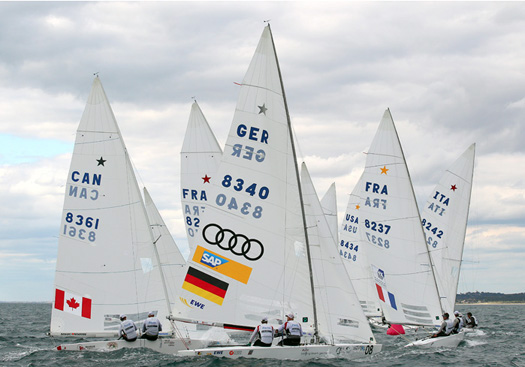
Tight racing in the penulitmate rounds of the Star champs in Perth. Photo: Richard Langdon
The Star class have a rest day tomorrow with their final day of fleet racing taking place on Friday.
Irish Skiff Pair Qualify for London Olympic Games
#PERTH 2011 – Belfast pairing Ryan Seaton and Matt McGovern are on their way to the London Olympic Games thanks to another solid performance in Perth today in the crucial closing stages of the 49er World Skiff Championships. It's Ireland's second successful qualification result at the ISAF World Championships. Last week Annalise Murphy became the first Irish sailor through. The pair who been recording impressive results in the breezy championships currently lie 10th overall and seventh country. Seaton and McGovern took two fifth places today to take Olympic qualification with ease.
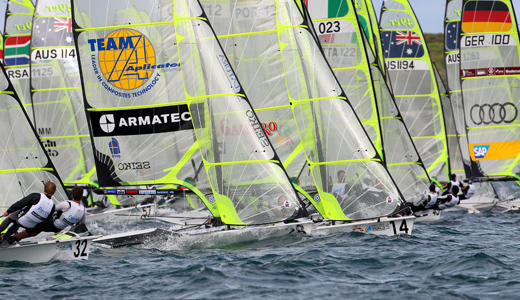
Ryan Seaton and Matt McGovern from Ireland have qualified for the Olympics in the 49er class today. Photo: Richard Langdon
The 67– boat fleet now splits into Gold and Silver fleets with the top 25 boats entering the Gold fleet. Racing will continue through to Saturday with the top 10 teams then continuing on to the medal race on Sunday.
Fourteen London 2012 49er spots were available at Perth 2011 and after eight races the 14 places have been decided. Australia, Austria, Croatia, Denmark, Spain, Finland, France, Germany, Ireland, New Zealand, Poland, Portugal, Sweden and the USA will all be on the starting line at Weymouth next year.
Croatia's Pavle Kostov and Petar Cupac made the gold fleet by six points ahead of Steve Thomas and Jaspar Warren (AUS). They take the last qualification spot and if selected will compete at their second Olympic Sailing Competition after their 17th place finish at Beijing 2008.
Five more 49er spots will be available at the 2012 World Championship in Zadar, Croatia from 4-13 May 2012.
49er Duo Stay on Course for Qualification
#PERTH 2011 – Light winds did 49er pair Ryan Seaton and Matt McGovern no harm in Perth today. The Irish pair scored a 7th, 11th and 12th in their three races and now lie 15th overall. It was not as spectacular as their opening day but the consistent scores keeps the duo on track for Olympic qualification. A further three days of racing will take place for the 49er class before the medal race on Sunday. The top 14 nations will earn their place at London 2012. Seaton and McGovern are currently eighth nation.
After a hard day of dramatically fluctuating winds and more than 10 capsizes in the racing, Denmark’s Peter Kruger Andersen and Nicolai Thorsell are the overall leaders at the end of the second day of competition for the 49ers at the ISAF Worlds.
Erik Storck and Trevor Moore (USA) finished first in race 4 for the Yellow fleet, crossing the line 21 seconds ahead of Santiago Silveira and Philipp Umpierre (URU), who placed second.
Race five saw Allan Noerregaard and Peter Lang (DEN) win comfortably with David Evans and Edward Powys (GBR) second and Storck and Moore with another good race in third place.
After a complicated start with several boats called back to the line, Kruger Anderson and Thorsell (DEN) took out the sixth race a massive 101 seconds ahead of Jonathan Ladha and Daniel Inkpen (CAN), with Storck and Moore again in third place.
The first race of the day for the Blue fleet saw wind speeds soar to 23 knots in the last leg of the race which allowed Australia’s Nathan Outteridge and Iain Jensen to maintain the lead for the entire race, crossing the line 42 seconds ahead of Emil Toft Nielsen and Simon Toft Nielsen (DEN).
Outteridge and Jensen had another win in race 5, with the Nielsen brothers once again finishing shortly behind by a mere 11 seconds.
Wind changes caused huge dramas in the last race of the day resulting in constant course alterations, but this did little to hinder Stephane Christidis and Emmanuel Dyen (FRA) who crossed the line first, 21 seconds ahead of Will and Sam Phillips (AUS).
Favourites to win the last race, Outteridge and Jensen struggled from the start and ended up finishing 13th.
The 49er competition is scheduled to continue on Wednesday from 1200 local time on the Owen course.
Seaton and McGovern Eighth in Perth 49er Championship
#PERTH2011 – Although Ryan Seaton and Matt McGovern are discarding 12th scored in today's sixth race of the 49er world championships, the Belfast lough pairing stay solidly in the top ten overall. Their first time bid for qualifcation at next year's London Olympics stays on target too as the regatta approaches the half way stage. They lie eighth overall dropping three places from a stunning opening day where they finished second in the first race of the series.
O'Leary and Burrows Straight into Third Place
#PERTH2011 – Ireland's Peter O'Leary and David Burrows have sailed straight to the top of the Star keelboat leaderboard after the first day's racing of the ISAF world Championships today. The Cork-Dublin pairing are third overall having counted an 8 and 2 in the 42 boat fleet and just three points off leaders, the current Olympic Gold Medallists Iain Percy and Andrew Simpson from Great Britain.
The Irish Stsr boat is out of the water this evening having damage repaired after a second race collision, O'Leary and Burrows are working on the basis that all should be good by tomorrow for the important third race of the series.
Latest results here
Focus Now on Barcelona as Owens and Flannigan Miss the Cut
#PERTH2011 – Double Olympian Ger Owens and his crew Scott Flannigan can still qualify for the London Olympics in the 470 class but to do so they will need to be in top form next May in Barcelona having missed the standard in Perth today. The 2012 470 world championships in six months time is the second and final opportunity for the Dublin duo to qualify but places, just two months before the Olympic regatta itself, are extremely limited.
Annalise Back in Medal Contention with Two More Race Wins
#PERTH2011 – Irish sailor Annalise Murphy needs to beat America's Paige Railey by at least four places to win a bronze medal in tommorrow's Laser Radial final following a stunning performance in Perth today with two further race wins at the ISAF World Championships.
18 knot winds gave the Natonal Yacht Club Sailor (who qualified for the London Olympics this week) the chance to shine again today and significantly narrow the point's gap going in to Sunday's Medal Race.


























